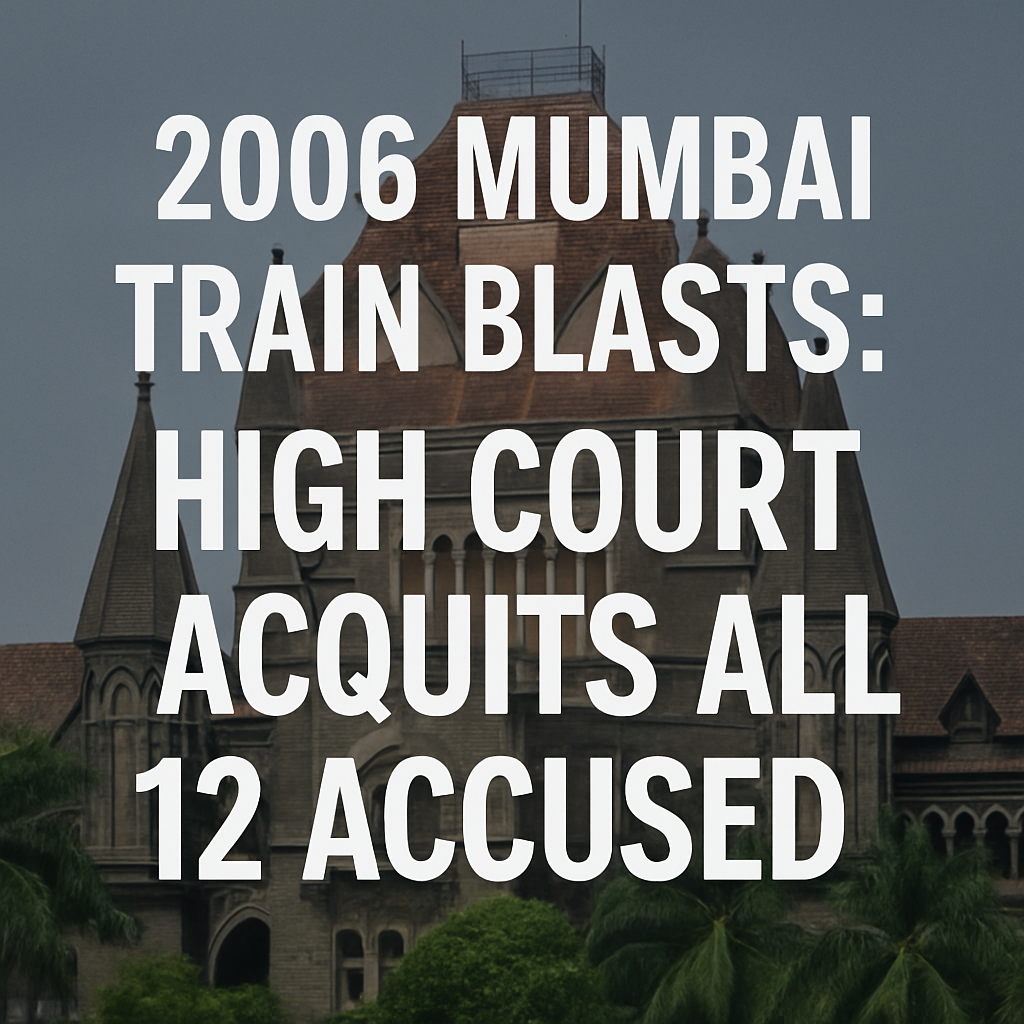2006 Mumbai Train Blasts: Bombay High Court Acquits All 12 Accused, Overturns Death and Life Sentences
Introduction: A Historic Decision After 18 Years
In a landmark judgment, the Bombay High Court on Monday acquitted all 12 convicts in the 2006 Mumbai train bombings case, overturning the death and life sentences handed down by a special MCOCA court in 2015. This decision comes nearly two decades after the devastating blasts shook Mumbai’s local train network, claiming 189 lives and injuring over 800.
What Happened in 2006?

The Attack
On July 11, 2006, seven coordinated blasts tore through the first-class compartments of suburban trains during peak hours on Mumbai’s Western Railway line. The explosions killed 189 commuters and injured 824 others, marking one of the deadliest terrorist attacks in India’s history.
Initial Verdict: 13 Accused, Harsh Sentences
The trial under the Maharashtra Control of Organised Crime Act (MCOCA) concluded in 2015 after an eight-year legal process. Out of the 13 accused:
One accused – Wahid Shaikh – was acquitted by the special court.
The court sentenced five to death.
Seven received life imprisonment.
One of the five on death row died in jail during the COVID-19 pandemic.
These convictions were based on various charges including criminal conspiracy, promoting terrorism, murder, and violations of the Unlawful Activities Prevention Act (UAPA), Indian Penal Code, Explosive Substances Act, and the Railways Act.
Bombay High Court’s Judgment: All 12 Accused Acquitted
Court Sets Aside All Convictions
After nearly six months of hearings, a special bench of Justices Anil S. Kilor and Shyam C. Chandak found that the prosecution had failed to prove its case beyond reasonable doubt. The court noted serious flaws in the investigation, especially the credibility of prosecution witnesses and the Test Identification Parade (TIP) conducted for the accused.
“It is dangerous to conclude that the appellant accused committed the offense for which they have been convicted and condemned,” Justice Kilor said while delivering the verdict.
The court declared that the conviction and sentences must be annulled and set aside, and ordered the release of all 12 accused, provided they are not wanted in any other case. Each of them must sign a personal bond of Rs. 25,000.
Key Accused and Their Initial Sentences
Death Sentences (Now Overturned)
1. Kamal Ahmed Mohd Vakil Ansari – Bihar
2. Mohammad Faisal Ataur Rahman Shaikh – Mumbai
3. Ehtesham Qutubuddin Siddique – Thane
4. Naveed Hussain Khan – Secunderabad
5. Asif Khan Bashir Khan – Jalgaon, Maharashtra
These individuals were convicted for planting bombs in the train compartments.
Life Imprisonment (Now Overturned)
1. Tanveer Ahmad Mohammed Ibrahim Ansari
2. Mohammed Majid Mohammed Shafi
3. Shaikh Mohammed Ali Alam Shaikh
4. Mohammed Sajid Margub Ansari
5. Muzammil Ataur Rahman Shaikh
6. Suhail Mehmood Shaikh
7. Zameer Ahmed Latifur Rehman Shaikh
Defense vs. Maharashtra Government: Legal Battle in Court
Maharashtra Sought Confirmation of Death Sentences
In 2015, the Maharashtra government approached the Bombay High Court to confirm the death penalties awarded to the five convicts. At the same time, all 12 convicts filed appeals challenging their convictions.
Defense Raised Concerns About Torture and False Evidence
The defense team, including former Delhi High Court judge S. Muralidhar, and senior advocates Nitya Ramakrishnan, S. Nagamuthu, Yug Mohit Chaudhry, and Payoshi Roy, strongly argued that:
The accused were falsely implicated.
Their extra-judicial confessions were obtained through torture by the Maharashtra Anti-Terrorism Squad (ATS).
There was no solid evidence linking them to the crime.
The prosecution relied on flawed testimonies and circumstantial evidence.
The accused had already lost 18 years of their lives in jail without proven guilt.
They maintained that the trial court had erred, and that justice had been denied for nearly two decades.
The High Court’s Reasoning: Doubts Over Evidence
The special bench carefully reviewed over 169 volumes of case documents, which included nearly 250 witnesses, of whom 92 were for the prosecution. The court highlighted:
Major discrepancies in witness accounts.
Procedural lapses during identification parades.
A general lack of conclusive forensic or physical evidence.
Due to these concerns, the court concluded that the “prosecution utterly failed to establish the offenses beyond a reasonable doubt.”
A Delayed Verdict, but a Landmark One
Although the hearing concluded on January 31, 2025, the judgment came more than five months later. The High Court had formed a dedicated bench in July 2024 for swift disposal of the long-pending appeals.
This verdict is being seen as a serious indictment of the investigation process and raises questions about how innocent citizens may have suffered due to institutional failures.
Maharashtra Government to Challenge High Court Verdict in Supreme Court
State Plans to Appeal Acquittal of All Accused in 2006 Train Blasts Case
The Maharashtra government is now preparing to move the Supreme Court to challenge the recent Bombay High Court verdict, which acquitted all 12 accused in the 2006 Mumbai train bombings case.
Political and Legal Repercussions for the State
This decision could tarnish the image of the state government, as it raises serious questions about the handling of the case by both the investigative agencies and the prosecution.
In a significant blow, none of the arguments presented by the state-appointed public prosecutor in the Bombay High Court were accepted by the bench. This has led to a sense of urgency within the state to seek a review of the verdict.
Serious Concerns Over the Investigation Process
The verdict also casts doubt on the entire investigation, prompting natural questions about the role of both the investigating agencies and the state government. How could a case involving 189 deaths result in zero convictions after 18 years? This question is now at the heart of the public and legal debate.
Conclusion: A Call for Reform in India’s Justice System
This case serves as a reminder of the urgent need for reform in India’s slow-moving legal system. The accused spent 18 years in prison under the weight of charges that the court has now declared unproven.
“India’s legal process moves at the pace of a turtle. If the court finds the accused innocent after so many years, it clearly highlights the need for systemic reform.”
